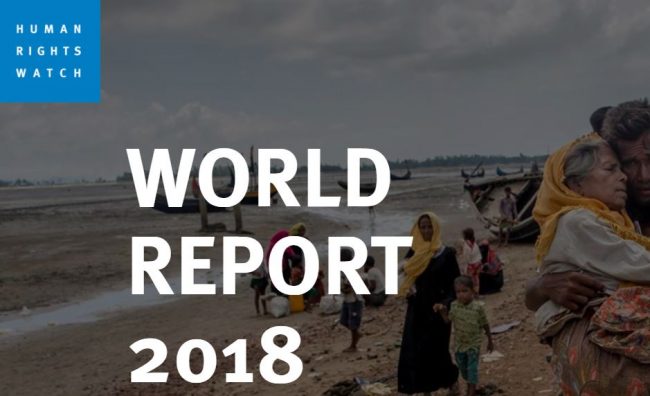

 In 2017, Georgia continued to pursue punitive criminal drug policies, Armenian Parliamentary elections failed to improve public confidence in the electoral system, while domestic violence remains a serious problem in the country, and the Azerbaijani government intensified its crackdown on critics, — according to the annual report from American rights group Human Rights Watch (HRW).
In 2017, Georgia continued to pursue punitive criminal drug policies, Armenian Parliamentary elections failed to improve public confidence in the electoral system, while domestic violence remains a serious problem in the country, and the Azerbaijani government intensified its crackdown on critics, — according to the annual report from American rights group Human Rights Watch (HRW).
In their 28th edition of the annual World Report, HRW included detailed chapters about the state of human rights in Armenia, Azerbaijan, Georgia, and Russia. One of the most common problems in the entire Caucasus region remained discrimination against queer people.
Crackdown on queer people
The report detailed the persecutions in Chechnya of queer men, which intensified in February and early April, when, according to HRW, security officials unlawfully rounded up dozens of men they believed were gay, searched their mobile phones for contacts of other gay men, and tried to coerce them, including through torture, into naming their gay acquaintances.
Chechen authorities responded to the accusation by denying the existence of gay people in Chechnya. The report said they suggested ‘obliquely’ that families kill their gay relatives, and accused journalists and human rights defenders of seeking to destabilise the republic.
[Read on OC Media: Kadyrov blames family for ‘murder of Chechen singer Bakayev’]
The chapter on Azerbaijan includes reports of the detention of dozens of people presumed to be queer on ‘dubious disobedience charges’. It also repeats what a number of local and international media has reported about police ill-treatment of detainees in order to coerce bribes, as well as information about other gay men.
[Read on OC Media: Arrests, threats, and humiliation in Azerbaijan’s crackdown on queer people]
In Armenia, HRW wrote that queer people often face harassment, discrimination, and violence. As an example, the report quoted queer rights group PINK Armenia as documenting nine physical attacks based on sexual orientation or gender identity through August. Although officials opened investigations into several cases, the law does not include discrimination based on sexual or gender identity as an aggravating circumstance.
[Read on OC Media: ‘Why can’t I kiss my girlfriend in public?’ The story of an Armenian queer woman]
Georgia has faced criticism for defining marriage as a ‘union of a woman and a man’ in its new constitution, the report said. Rights groups fear this could feed widespread homophobia in the country.
[Read on OC Media: Georgian rights groups back civil partnerships for same-sex couples
Other concerns
The World Report said that Armenia’s Parliamentary elections, which were the first since 2015 constitutional amendments, ‘failed to improve public confidence in the electoral system’, as the ruling Republican Party dominated amid reports of voting irregularities. It also focused on the authorities failing to bring to justice officials who are allegedly responsible for ‘excessive use of force against protesters and journalists’.
As underlined in a separate report, the lives and well-being of survivors of domestic violence — women and children — are in jeopardy because of the Armenian government’s failure to ensure their protection.
During their crackdown on independent voices, Azerbaijani authorities convicted at least 25 journalists and political activists, according to the report, while adding that dozens more were detained or are under criminal investigation, face harassment and travel bans, or have fled.
[Read on OC Media: What does an Azerbaijani journalist need the most: a free flat or a free environment?]
The group called a number of Azerbaijani laws ‘draconian’ as they impede independent groups’ work and ability to secure funding. It also claimed that torture and ill-treatment in custody persist.
The case of recently convicted journalist Afgan Mukhtarli was also mentioned in the report, with HRW decrying his abduction in Tbilisi and his illegal transfer to Azerbaijan.
[Read on OC Media: Azerbaijan under fire over sentencing of abducted journalist Mukhtarli]
In Georgia, HRW focused mostly on the constitutional reforms that the ruling Georgian Dream party passed last year. These cemented the country’s parliamentary system of governance, ‘without securing broader political consensus’.
[Read on OC Media: Georgia’s new constitution keeps real change in check]
Lack of accountability persisted for abuses committed by law enforcement agents, and HRW said that Georgia does not have an effective independent mechanism for investigating abuse by law enforcement officials. It also pointed out that Georgia maintained punitive criminal drug policies for drug users.
[Read on OC Media: Georgia’s ‘war against the people’ and the war against a ‘system that stinks’]
Other areas of concern included privacy rights, labour rights, media freedom and the rights of lesbian, gay, bisexual, and transgender (LGBT) people.
The reports comes days after American rights group Freedom House published their Freedom in the World report, which claimed South Ossetia and Azerbaijan are among the least free places in Europe, and underlined a number of human rights abuses in the Caucasus.
[Read a summary of Freedom House’s Freedom in the World report on OC Media: Crimea, South Ossetia, Azerbaijan ‘least free places in Europe’]









